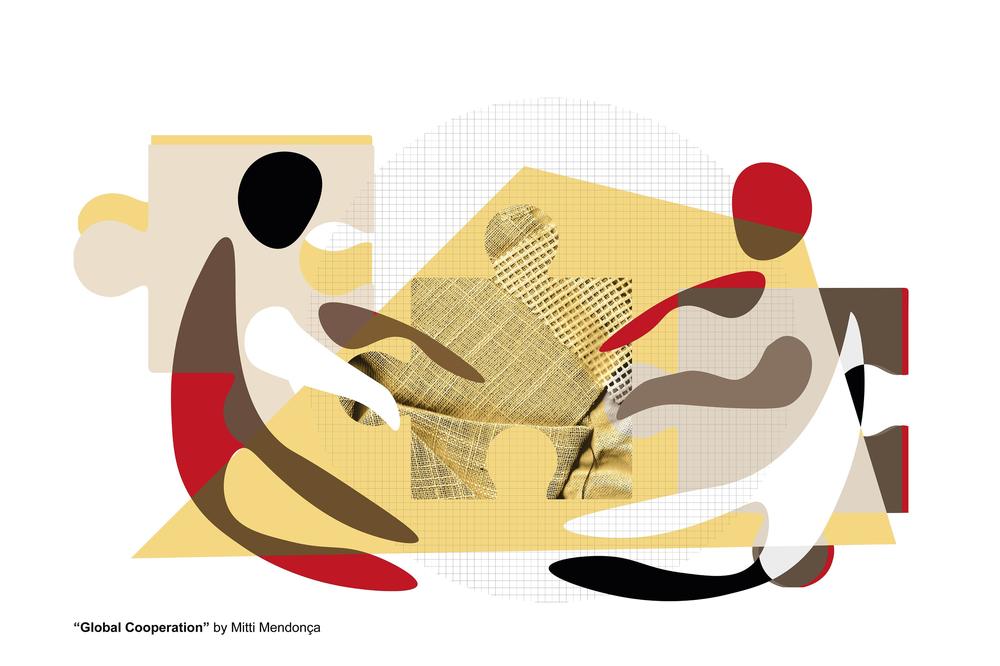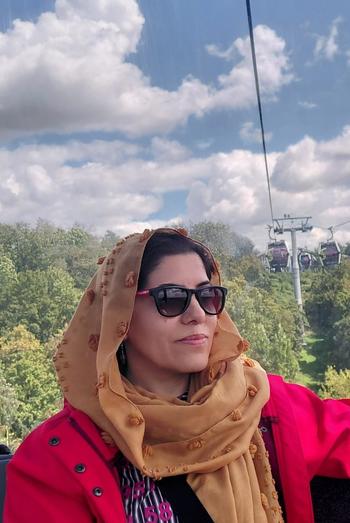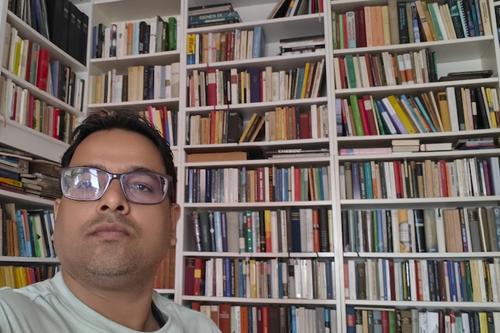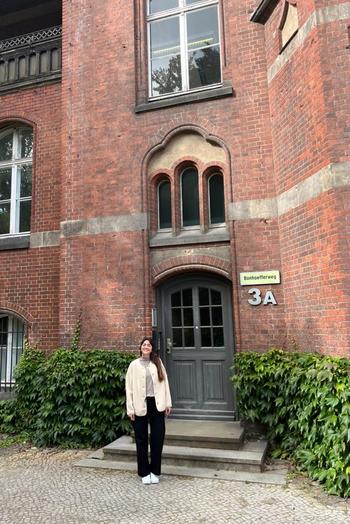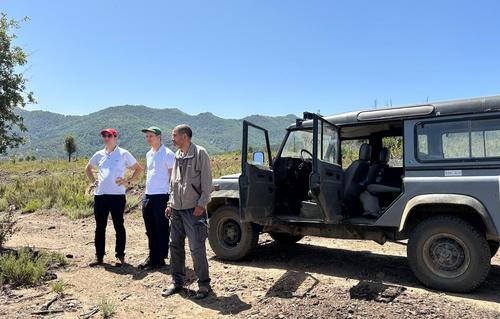“No amount of reading could have given me these impressions.”
Four Berlin University Alliance researchers from the Global South talk about how important the Berlin Center for Global Engagement’s Flexible Travel Funds have been to their work, enabling research travel in both directions.
Oct 30, 2025
Flight, room, and board: The Berlin Center for Global Engagement supports research visits between Berlin University Alliance researchers and their partners in the Global South.
Image Credit: BCGE/Mitti Mendonça
Research thrives on exchange – and the best ideas arise when people engage with new perspectives. The BCGE Flexible Travel Funds allow researchers to conduct short research stays in the Global South without a lot of red tape. The funds can be used to invite experts to Berlin or, inversely, by researchers in Berlin who wish to travel abroad. This financial support helps scholars and scientists advance projects, deepen collaborations, and develop new approaches. Four researchers who made use of these funds share how their research stays took their work to the next level.
Dr. Abida Bano has been teaching political science at the University of Peshawar in Pakistan since 2009: “My stay allowed me to explore new avenues for collaborative research”
I have been teaching at the University of Peshawar since 2009. During this time, I have worked in the Department of Gender Studies, the Institute of Peace and Conflict Studies, and the Department of Political Science, where I am currently situated. The BCGE Flexible Travel Funds enabled me to travel to Humboldt-Universität zu Berlin from July to August, 2025, where I worked with Dr. Sarah Holz at the Institute for Asian and African Asian Studies (IAAW). Dr. Holz and I collaborated on several projects and carried out teaching together.
This stay was central to the further development of our joint proposal for an edited volume on Pashtun millennials. During my time in Berlin, we also co-authored a chapter on research methodologies for a book that will be published as part of the co2libri project – one of BCGE’s signature research projects. The co2libri project aims to raise awareness of knowledge, theories, and research practices from the Global South in Berlin. In addition to these activities, networking was an important aspect of my stay. I was able to explore new avenues for collaborative research that were of interest to both myself and other researchers in Berlin. For example, I met with Dr. Andrea Fleschenberg dos Ramos Pinéu (Humboldt-Universität zu Berlin) and Professor Kai Kresse (Freie Universität Berlin) to discuss the possibility of pursuing a research fellowship to complete my work on youth social movements in the peripheries of Pakistan.
My research stay in the busy metropolis of Berlin not only benefited my academic and research work – it gave me the opportunity to observe and interact with society firsthand. Berlin is a very open city, conducive to personal growth and development. With its diverse range of food, clothes, and languages, Berlin is particularly inviting for people with limited German skills, or who speak no German at all. This made it easy to get to know people and the city itself. I was very impressed when I visited a flea market and found Pakistani artisan goods, African and Asian food, and international music. One of the most memorable day trips I made was a chairlift ride to the Gärten der Welt, which gave me a bird’s eye view of the whole city. I found Berlin to be a very well-planned city, with an efficient public transportation system that makes it easy for visitors to get around.
Dr. Kashif Shamim, MD, postdoctoral researcher in physics: “Berlin has broadened my horizons – both scientifically and personally.”
After completing my doctorate at Anugrah Narayan College in Patna, under Magadh University, in 2020, I was able to spend a month at Freie Universität Berlin in the summer of 2025 thanks to the BCGE Flexible Travel Funds. There, I worked on a research project dealing with the optical behavior of ferroelectric thin films. These ultrathin materials have their own built-in electrical polarity that can be switched by use of an external electrical field. They are used in non-volatile memory, high sensitivity sensors, energy harvesting, next-generation, low-power electronics, and neuromorphic computing.
With twenty-six publications in international journals, I already had experience in the field, but my stay at Freie Universität Berlin greatly enriched my research. I learned about state-of-the-art methods in a first-class research environment and made contacts that will lay the foundation for future collaborations.
Berlin was not only a scientific milestone for me, but also a place of cultural enrichment. From the collaboration with colleagues in the laboratories to the historical sites I explored, I experienced numerous moments of inspiration. I visited sites where Albert Einstein and Max Planck did their research – that piqued my intellectual curiosity and strengthened my resolve to make a contribution to science. Walking along the East Side Gallery I could feel the pulse of freedom in every mural. The openness of the people and the rich cultural heritage of the city left a deep impression on me. This stay was more than a research visit – it was a journey that broadened my horizons.
Dr. Victoria Peterson researches and teaches computational neuroscience: “Undoubtedly, it has been a unique experience.”
I am a CONICET assistant researcher at the Instituto de Matemática Aplicada del Litoral (Applied Mathematics Institute, IMAL), a UNL-CONICET Joint Research Institute based at CCT-CONICET Santa Fe, Argentina. I am also an associate professor at the Faculty of Chemical Engineering at Universidad Nacional del Litoral (UNL), Santa Fe, Argentina, where I teach data-science related courses.
When I was a Harvard postdoctoral affiliate, I took part in a research project in the field of computational neuroscience from 2020 to 2022. This was a collaborative project that was carried out between the USA and Germany, led by Professor Wolf-Julian Neumann from Charité – Universitätsmedizin Berlin and Professor Mark Richardson from Massachusetts General Hospital (Boston, USA). During those years I worked closely together with Professor Neumann and his team, a collaboration that resulted in several publications. In 2022 I returned to Argentina to assume my professorship position.
Thanks to the BCGE Flexible Travel Funds I was recently able to visit the Interventional Cognitive Neuromodulation Lab, led by Professor Neumann at Charité, for a period of four weeks. This research stay allowed me to reconnect with Professor Neumann, to carry out some valuable work together, and to gain more experience in areas of research not available to me in my country. Because of this visit we were able to analyze previously acquired datasets for the very first time, and strengthen a successful collaboration from the past with a view to generating more fruitful research in the future. It has been an exceptional opportunity to conduct high-impact research and to foster partnerships with experienced European researchers.
My work focuses on the development of solutions for machine learning with the aim of improving neural decoding systems for neurotechnologies with health-related applications. I have specialized in brain-computer interfaces (BCIs), i.e., technology that transforms brain activity into outputs that allow people to control external devices. I first started studying this topic more than twelve years ago in my senior years of college. Throughout my career, I have been able to draw upon the research carried out by scientists based in Berlin when conducting literature reviews. During this stay I had the privilege of meeting most of them in person, as well as the opportunity to give talks and present my work in their research labs. Undoubtedly, it has been a unique experience. It meant a lot to me as a passionate researcher who has learned so much from these internationally recognized scientists. Furthermore, I will always remember my days in Professor Neumann’s lab, whose members made me feel at home. I would like to extend a big thank-you to everyone who made my research stay an unforgettable moment in both my professional and personal life!
Dr. Sebastian Fiedler, postdoctoral researcher in plant ecology, Technische Universität Berlin: “Field research showed me how deeply humans and ecosystems are connected.”
My research focuses on restoring degraded dryland ecosystems so that they can continue to fulfill important functions, such as preventing erosion and providing logging resources for local communities, in the long term. So far in my research, I have mainly used computer models, but in the future I would like to incorporate the perspectives of local stakeholders even more and investigate how forests can become more resilient to the increasing number of forest fires associated with climate change.
Thanks to the BCGE Flexible Travel Funds, I was able to travel to Tétouan in northern Morocco to work with Dr. Mchich Derak from the regional forestry department. Together, we visited the Bouhachem Natural Park and met people who are committed to protecting and restoring oak forests facing growing wildfire risks.
These encounters were invaluable for my research. The people I met shared their motivation, knowledge, and social and cultural perspectives with me firsthand. I also got to see both healthy and degraded ecosystems for myself. No amount of reading could have given me these impressions. They inspired me to come up with new ideas for joint projects and laid the foundation for future collaborations.
The most impressive moment during my trip was standing in the middle of the oak forests: a place of great beauty where I could feel the deep motivation of the local communities to protect their environment.
The original German version of this article appeared in campus.leben, the online magazine published by Freie Universität Berlin.
Further Information
BCGE Flexible Travel Funds
The Berlin Center for Global Engagement (BCGE) at the Berlin University Alliance (BUA) supports joint projects and research collaborations with partners in the Global South in a variety of ways. One of these is the Flexible Travel Funds that provide funding for international guest stays of up to four weeks. The funds can be used for BUA members to visit partners in the Global South, or for researchers in the Global South to visit their colleagues in Berlin. They cover the costs of flights and can be used to subsidize accommodation and meals. The application process is quick and simple, ensuring that the Flexible Travel Funds can be used for their intended purpose: promoting global exchange. The call for applications takes place once a year.
More information can be found here.

